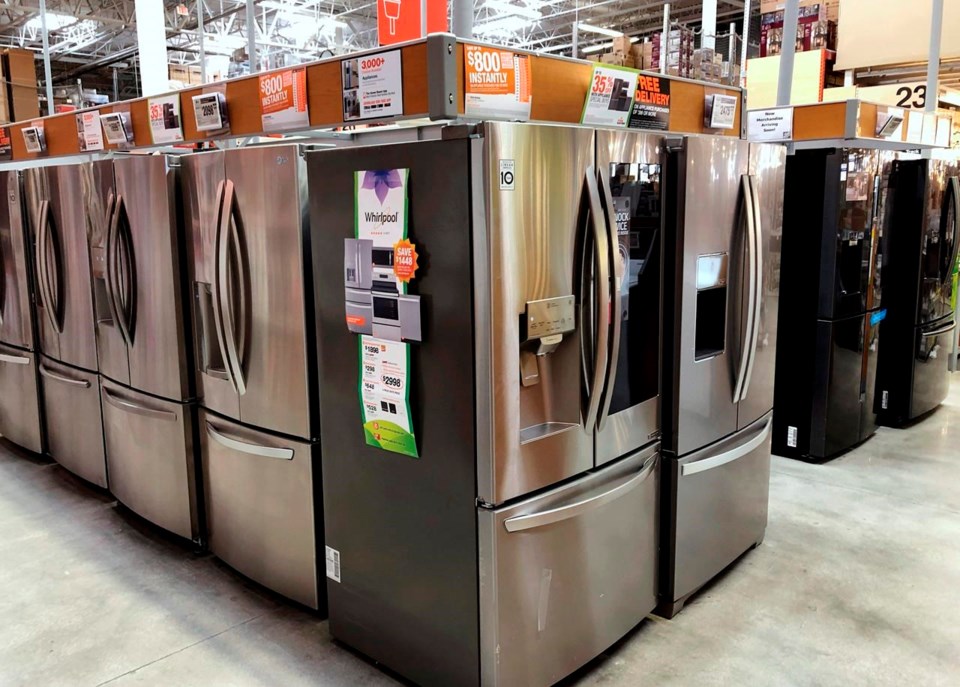CALGARY — Appliance repairman Vlad Bagatov doesn't do extended warranty repair work, but he knows a lot about extended warranty complaints.
That's because the owner of Maple Leaf Appliance Repair in Calgary is often called by clients whose ailing refrigerators, stoves or washing machines aren't being fixed as expected under the warranties they purchased years earlier.
"From my experience, usually when you take an extended warranty and your fridge breaks down, it's about two to three weeks to get it repaired ... Can you imagine going without a fridge for three weeks?" he said.
"So they call us and we say it's $600. They say, you know what, I'll pay $600 because I need my fridge today."
Consumers buying a new large appliance are often caught off-guard at the checkout counter by the offer of an extended product protection warranty, said Ken Whitehurst, executive director of the Consumers Council of Canada.
The plans, available at an extra cost, offer protection against breakdowns and damage beyond the usual one-year manufacturer's warranty included in the price of the item.
A study completed by the council in 2018 included a survey of 2,000 consumers that found about 30 per cent of respondents had purchased extended protection on a major household durable item in the past three years.
"One thing we did find that was a bit problematic is the way a lot of extended product warranty is sold," said Whitehurst.
"So, you're in, and then suddenly it's sprung on you as an add-on and you start thinking about it and, before you know it, you made the purchase because maybe you're a little risk averse and you're thinking, 'I'm laying out a lot of money and what if it just dies tomorrow?'"
Those who bought the plans said they were more likely to buy if the item was more expensive, the survey showed. The convenience of have one phone number to call if a breakdown occurred was a major selling point.
Non-purchasers reacted negatively to the cost of protection and more than half said they made it a policy to never purchase extended protection plans.
The survey found that consumers who purchased protection on one product were about three times more likely than other consumers to purchase protection on another product.
It added that extended protection plans were frequently misunderstood — purchasers didn't know what was and wasn't covered — and that better-informed consumers were generally less likely to purchase them.
It also found that about one-quarter of claims for service through plans were considered to have been resolved unsatisfactorily or with substantial inconvenience.
The report's recommendations include having retailers offer more than one kind of extended warranty to provide choice and price competition, along with better disclosure of the existing base warranty on the product.
Consumers should consider options to product protection plans including "self insurance," said Whitehurst.
"It's possible to self-insure, you know, which is probably the cheapest option of all in most cases. You say, 'I bought something. Its care and keeping and replacement is going to cost something. So I should plan to budget for that.'"
In the case of a computer, which might be outdated and in need of replacement by the time it requires serious repair, consumers might be better off to buy an ongoing service plan, he said.
Some insurers now offer interior home breakdown protection plans which offer limited coverage of all of the major home systems and appliances for one price, although those plans haven't been assessed by the Consumers Council.
Many extended product protection plans are offered by third-party insurance companies, even though they are sold by the retailer, which can create confusion for consumers, Whitehurst said.
One of them, Laval, Que.-based Comerco Services Inc., says it is the Canadian leader in protection plan management.
"To ensure peace of mind" is the first item in a posting on its website entitled Why buy a Comerco Protection Plan?
It goes on to list benefits including coverage that lasts longer and gives more coverage than manufacturer's warranties, protection against high repair costs, repairs made to the manufacturer's specifications and transferability of plan from one owner to the next.
Comerco didn't respond to a request for comment for this article.
Dealing with the retailer's in-house warranty program is no guarantee of better service, noted Whitehurst, recalling the 2018 bankruptcy of Sears Canada, which abruptly ended its Sears Protection plans and left some buyers of its Kenmore appliances in the lurch.
He said provincial governments should offer better consumer protection legislation.
"We actually think there needs to be some serious reform around warranty, repair, durability ... this is not a good, safe and rational marketplace for people to buy in."
This report by The Canadian Press was first published Sept. 10, 2020.
Dan Healing, The Canadian Press



